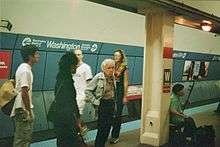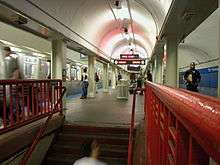Washington station (CTA Red Line)
| |||||||||||||||||||||||||||||||||||||||||||||||||||||
|---|---|---|---|---|---|---|---|---|---|---|---|---|---|---|---|---|---|---|---|---|---|---|---|---|---|---|---|---|---|---|---|---|---|---|---|---|---|---|---|---|---|---|---|---|---|---|---|---|---|---|---|---|---|
 Washington/State station in May 2005 prior to its October 2006 closure | |||||||||||||||||||||||||||||||||||||||||||||||||||||
| Location |
128 North State Street Chicago, Illinois 60602 | ||||||||||||||||||||||||||||||||||||||||||||||||||||
| Coordinates | 41°53′01″N 87°37′40″W / 41.8837°N 87.6278°W | ||||||||||||||||||||||||||||||||||||||||||||||||||||
| Owned by | City of Chicago | ||||||||||||||||||||||||||||||||||||||||||||||||||||
| Line(s) | |||||||||||||||||||||||||||||||||||||||||||||||||||||
| Platforms | 1 Island platform | ||||||||||||||||||||||||||||||||||||||||||||||||||||
| Tracks | 2 | ||||||||||||||||||||||||||||||||||||||||||||||||||||
| Construction | |||||||||||||||||||||||||||||||||||||||||||||||||||||
| Structure type | Subway | ||||||||||||||||||||||||||||||||||||||||||||||||||||
| History | |||||||||||||||||||||||||||||||||||||||||||||||||||||
| Opened | October 17, 1943 | ||||||||||||||||||||||||||||||||||||||||||||||||||||
| Closed | October 23, 2006 | ||||||||||||||||||||||||||||||||||||||||||||||||||||
| Services | |||||||||||||||||||||||||||||||||||||||||||||||||||||
| |||||||||||||||||||||||||||||||||||||||||||||||||||||
| |||||||||||||||||||||||||||||||||||||||||||||||||||||
Washington/State is an abandoned 'L' station on the CTA's Red Line. It was a subway station in the State Street Subway located at 128 North State Street in downtown Chicago, Illinois. It is the only closed CTA subway station. At street level at State & Washington is the terminal for night owl bus routes.
History
Structure


The platform at Washington/State is part of a long continuous platform beneath State Street which runs from the Jackson station to the Lake station, spanning nearly seven blocks, making it the United States' longest continuous passenger platform. There were two mezzanines with turnstiles for the station: a northern at Randolph shared with the Lake station and a southern at Madison. There are stairs and escalators along State Street between Randolph and Madison to access both mezzanines. Additionally, Washington is equipped with an elevator and was therefore accessible to people with disabilities.
There were two stairways on the platform to a lower level pedestrian tunnel that connected the Washington station to its counterpart on the Blue Line subway, Washington/Dearborn, to allow transfers between the Red and Blue Lines. Lake station to the north of Washington/State and Washington/State station were originally a single station, but they were separated on June 2, 1996 due to the renovation project of the Randolph-Washington mezzanine and Lake became an independent station on November 18, 1997 in order to better facilitate transfers between the Red Line subway and the elevated State/Lake station.
Closure for superstation
As part of the development of 108 North State Street (commonly known as "Block 37") the CTA planned to construct a superstation located between the Red and Blue Lines (which run in parallel subways through the Loop). Washington/State station, and the lower level transfer tunnel to the Blue Line were closed at 12:00 a.m. on October 23, 2006 for work related to the construction of this new station.[1] The platform was cut at an angle to facilitate a future track connection from the northbound State Street track to the super station and the northbound Blue Line track north of Washington, linking O'Hare and Midway airports via the Blue, Red, and Orange lines' tracks. A similar excavation was made north of the Blue Line's Washington station to allow a future connection for southbound Blue Line trains to travel east to the super station and the southbound Red Line track.
Following cost overruns of $100 million the superstation was indefinitely mothballed in June 2008.[2] The cut portion of the platform was rebuilt for safety and operational flexibility, and Washington/State was removed from CTA rail maps in January 2009.[3] Today the station remains indefinitely closed, with the entrances on street level covered with planters and the escalators also on street level covered with graphics. The Washington station signs on the walls remained until 2009 when the CTA removed the station signs from the walls to indicate that it was no longer a station.
Post closure
When the CTA closed the Washington/State station, most of it was left intact. No work was performed to decommission the Washington-Madison mezzanine, and the fare turnstiles and machines still remain. The platform changed little, except for the removal of its signage. However, the signs that say "Escalator: Washington-Madison" and "To Madison or Monroe St" were not removed for unknown reasons. Until February 2015, the "Washington: To Howard" and "Washington: To 95/Dan Ryan" signs also remained on the walls of the southern half of the Lake station. At some signs at Lake, rail line maps suggest the Washington station still exists. The station's recorded announcement file still remains on trains' audio systems, although the file is not directly programmed to line announcements and is not accessible by motormen via the regular announcement system. The station platform is still in good condition with the mezzanines nearly untouched. The CTA does not consider Washington/State permanently closed, but there are no current plans to reopen the station.
Reopening
On February 14th, 2016, Chicago mayor Rahm Emanuel announced the returning of the Airport Express service, however, without the Block 37 station, canceling the idea of the station being used. Because Washington was shut down to make room for superstation construction in the first place, this circumstance allows Washington to reopen. No reopening date has been set yet. [4]
References
- ↑ Washington (Red Line) Subway Station Closure. CTA press release (URL accessed October 19, 2006).
- ↑ Hinz, Greg (June 11, 2008). "CTA to halt over-budget superstation". ChicagoBusiness.com (Crain Communications Inc.). Retrieved June 11, 2008.
- ↑ Doyle, Michael (January 23, 2009). "Who Stole the 'L' Stop at Washington/State?". Chicago Carless (Chicago Carless). Retrieved January 23, 2009.
- ↑ Spielman, Fran. "Emanuel pushing O'Hare high-speed rail-without Block 37 station". Chicago SunTimes (Chicago SunTimes). Retrieved February 15th, 2016. Check date values in:
|access-date=(help)
External links
 Media related to Washington/State (CTA) at Wikimedia Commons
Media related to Washington/State (CTA) at Wikimedia Commons- Washington/State Station Page at Chicago-L.org